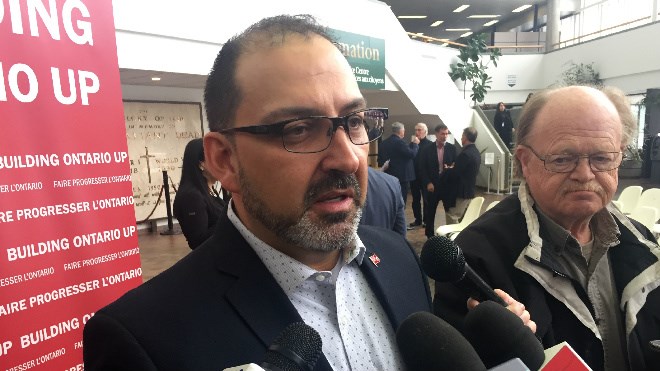Sudbury MPP Glenn Thibeault will be back on the stand Wednesday morning to complete his testimony at the Sudbury byelection bribery trial, after objections to the line of questioning by the Crown delayed proceedings Tuesday.
At issue is the content of the “commitments” Thibeault received from the Liberals before he decided to switch parties and legislatures in 2014.
The commitments were a professional and fully resourced byelection campaign, income replacement for himself and paid campaign jobs for two of his staffers,
Brian Band and Darrell Marsh. That's how he characterized the commitments in an interview with Elections Ontario.
Testifying on Tuesday, Thibeault said the party committed to a fully resourced campaign, and said he was told the income replacement and campaign jobs were doable. But he said there was no promise beyond the fully resourced campaign.
Crown prosecutor Rick Visca tried to argue that Thibeault was changing his testimony and wanted to ask him about it. But defence lawyers for Gerry Lougheed Jr. and Patricia Sorbara, the accused in the trail, said that wasn't fair.
Visca had the first opportunity to question Thibeault on Tuesday, but didn't raise the issue during his cross examination. Defence lawyers then questioned Thibeault, and Visca had more questions at that point.
But Lougheed lawyer Michael Lacy argued that was putting the defence at a disadvantage. He said Thibeault was being consistent, since the Elections Ontario interview didn't delve into the details of what Thibeault meant when he referenced income replacement and campaign jobs as commitments, or just something that was doable.
Under court rules, because Visca didn't raise the issue during his cross-examination, and only during followup questions, the defence couldn't ask followup questions to clarify what Thibeault actually meant.
Tuesday was Day 9 of the trial involving Sorbara, Premier Kathleen Wynne's former deputy chief of staff and Liberal campaign director, and Lougheed, a local Liberal organizer.
Both have pleaded not guilty to offering would-be candidate Andrew Olivier a job or appointment to get him to step aside for Thibeault in the 2015 byelection. Sorbara is also accused of inducing Thibeault to run by offering him income replacement and jobs for his staffers.
Earlier in the day, Thibeault denied that he sought a cabinet post before he would agree to make the switch.
“That's not something I would ask for,” Thibeault said.
Court heard that Thibeault met with Wynne at her home Nov. 30, 2014, for about an hour. The meeting went well, and he had a lot of questions about the process. He said he asked about income replacement because it was something the NDP offered and wanted to know if the Liberals offered it, too.
Similarly, he said the NDP paid people to knock on doors and work campaigns, and wanted to know if the Liberals did, too, and whether that was an option for his two staff.
After the meeting, Thibeault said he was 50-50 on whether he would make the switch, and asked for some time to decide.
"My concern, most of the time ... was for my family,” he testified. "If I lost the byelection, I was unemployed.”
He was giving the matter serious thought when he had an encounter in the House of Commons with Justin Trudeau, then Liberal leader, now prime minister.
“Good luck with your decision,” Trudeau told him on Dec. 5, 2014.
Thibeault was alarmed that word was getting around.
"I was concerned that something we were keeping in our inner circle was getting out,” he said.
After he decided to run, Thibeault said he wanted to talk with Olivier personally to try to smooth things over.
“I believed it was the sort of news that should be delivered in person,” Thibeault said.
But Sorbara said that was her job, and she and Lougheed spoke with Olivier in conversations Olivier recorded, sparking the current trial.
Thibeault said he also spoke with Olivier after Lougheed and Sorbara, and thought the conversation went well. But it seemed Olivier wasn't understanding it was no longer a race.
"He was having a hard time understanding he wasn't going to be the candidate," Thibeault said. “But I thought the meeting went really well.”
Thibeault's first choice was to be acclaimed the candidate, with Olivier on hand to support him. He considered making Olivier the honourary campaign co-chair and that it would have been a chance for him to gain some experience.
"Andrew and I could have done things together in the campaign, showing a united front," Thibeault said. "I was trying to get Andrew to see the positives of us working together ... I'm trying to bring a united party to the byelection."
But his hope began to fade after a few days, and while Thibeault hoped to wait until after Christmas to make the announcement, Olivier went public Dec. 15, 2014, and any hope of putting up a united front was over.
Court resumes Wednesday morning at 9 a.m.
